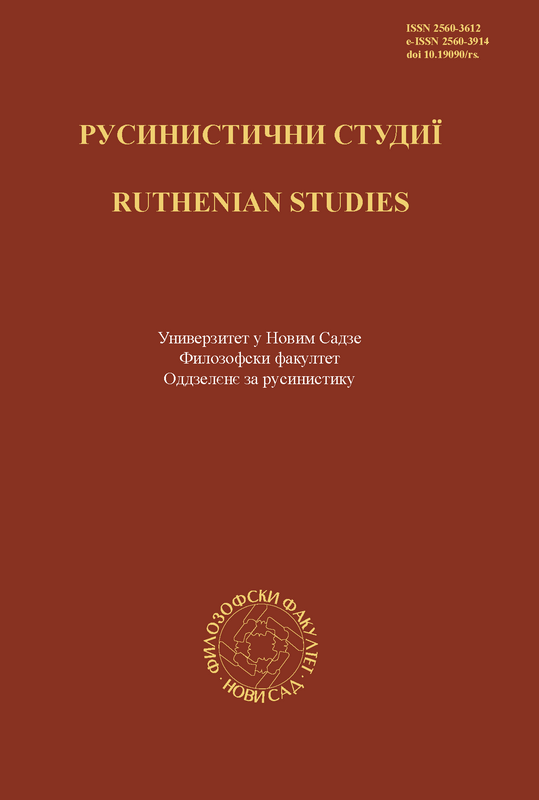ГЛАГОЛИ АУДИТИВНЕ ПЕРЦЕПЦИЈЕ У ВОЈВОЂАНСКОМ РУСИНСКОМ ЈЕЗИКУ У СВЕТЛУ СЛОВЕНСКЕ ЕТИМОЛОГИЈЕ
VERBS OF AUDITORY PERCEPTION IN VOJVODINA RUTHENIANIN THE LIGHT OF SLAVIC ETYMOLOGY
Author(s): Kaname OkanoSubject(s): Language and Literature Studies
Published by: Филозофски факултет, Универзитет у Новом Саду
Keywords: semantics; etymology; historical semantics; verbs of auditory perception; Vojvodina Ruthenian
Summary/Abstract: This paper provides a semantic analysis of the Vojvodina Ruthenian basic verbs expressing auditory perception with particular reference to their etymology and parallels in other contemporary Slavic languages. In Slavic languages, auditory perception is most often lexicalized by the verbs coming from *slyšati/*slušati, *sluxati/*slyxati,and *čuti. However, the distribution of these verbs differs in every contemporary language since they lexicalize the three main meanings of auditory perception, i.e., the meaning of active auditory perception, inert auditory perception, and passive auditory perception, in different ways. The first part of the paper deals with the etymology of the Slavic verbs of auditory perception and their semantic distribution in contemporary Slavic languages. The system of the Slavic verbs of auditory perception can be divided into three types: (1) Belorussian, Ukrainian, Carpatho-Rusyn, Serbian, Croatian, and Bulgarian use *slušati or *sluxati for the meaning of active auditory perception and *čuti for the meaning of inert auditory perception; (2) Russian, Polish, Czech, Slovak, and Slovene uses different verbs coming from the same root for the active and inert auditory perception; (3) Macedonian lexicalizes the two meanings of auditory perception using only one verb (sluša‘listen/hear’). The second part of the paper analyzes the Vojvodina Ruthenian verbs of auditory perception sluxac ‘listen’ and čuc ‘hear’. It is pointed out that in Vojvodina Ruthenian, the verb of active auditory perception sluxac ‘listen’ can be used with a proposition, and in such case, the verb with a proposition implies that the subject-Experiencer is sure that the information received by auditory perception is correct or certain, while the verb of inert perception čuc with a proposition implies that the information may be incorrect or uncertain. In this part, the two constructions for expressing the meaning of passive auditory perception are also analyzed: the construction with the reflective verb čuc še ‘be heard’ is usually used in the passive contexts but without any focus on the possibility of passive auditory perception, while the impersonal predicative construction buc čuc‘ (possible to) hear/be heard’ is preferred in the contexts referring to the possibility of passive auditory perception. In addition to that, it is pointed out that there are some parallels in some other Slavic languages such as Czech, Slovene, Slovak, and Ukrainian, and that a few other verbs such as obačic ‘spot’ and poznac ‘recognize’ can also appear in this construction and this fact requires more detailed investigation in the future.
Journal: Русинистични студиї
- Issue Year: 1/2022
- Issue No: 6
- Page Range: 171-190
- Page Count: 20
- Language: Serbian

